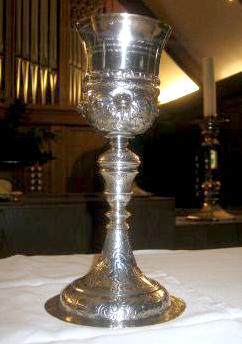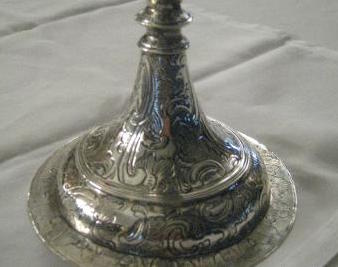 This antique Italian silver chalice and it’s matching wafer tray (paten) are kept in the safe in the sacristy and used at Christmas and Easter. Both of them are engraved To the glory of God, and in loving memory of Ruth Hazeltine Crocker January 26, 1901 January 25, 1920. The Crockers (there are many of them) are an old Barnstable family; the first of the line was Deacon William Crocker who came from Scituate in 1639 with John Lothrop and the group that founded Barnstable. By the 19th century some Crockers were Unitarians and some Episcopalians, probably attending the Methodist Episcopal Church which was next to the Lothrop Hill Cemetery. In 2007, for an exhibit at the Chatham Historical Society on the World War I Chatham Air Station, Ruth’s nephew, David Crocker, who now lives in Mashpee, put together a display board telling her story. He wrote ‘During their stay at the Chatham Naval Air Station, the naval officers and enlisted men would often travel to the Mill Hill Pavilion on the Hyannis/West Yarmouth line. There they could meet young to girls to dance with and become acquainted. Thus it was that Lt. Edwin Mott (a naval pilot at Chatham) met Ruth Crocker of Barnstable. Soon the two became engaged, and Ruth, perhaps because of h
This antique Italian silver chalice and it’s matching wafer tray (paten) are kept in the safe in the sacristy and used at Christmas and Easter. Both of them are engraved To the glory of God, and in loving memory of Ruth Hazeltine Crocker January 26, 1901 January 25, 1920. The Crockers (there are many of them) are an old Barnstable family; the first of the line was Deacon William Crocker who came from Scituate in 1639 with John Lothrop and the group that founded Barnstable. By the 19th century some Crockers were Unitarians and some Episcopalians, probably attending the Methodist Episcopal Church which was next to the Lothrop Hill Cemetery. In 2007, for an exhibit at the Chatham Historical Society on the World War I Chatham Air Station, Ruth’s nephew, David Crocker, who now lives in Mashpee, put together a display board telling her story. He wrote ‘During their stay at the Chatham Naval Air Station, the naval officers and enlisted men would often travel to the Mill Hill Pavilion on the Hyannis/West Yarmouth line. There they could meet young to girls to dance with and become acquainted. Thus it was that Lt. Edwin Mott (a naval pilot at Chatham) met Ruth Crocker of Barnstable. Soon the two became engaged, and Ruth, perhaps because of h er fondness for Lt. Mott, became obsessed with helping out with the war effort. She took on the responsibility of putting up the colorful World War I posters and also headed up the Liberty Bond Drives. She was passionate about women’s role in the war effort and became associated with the Red Cross. In 1919, when the flu epidemic was killing thousands across America, Lt. Mott received news that his mother, who lived in Brooklyn, NY, had contracted the deadly disease. Since she had Red Cross training, Ruth volunteered to nurse her through the illness. This she did, and because of Ruth’s care, Edwin Mott’s mother survived. However, Ruth came down with the terrible flu and, within two days, died in Brooklyn….just before her nineteenth birthday. Ruth’s parents were devastated and, in their grief locked her bedroom door and told her two younger brothers never to go in, or even talk about their sister again. It would be some thirty years before one of the brothers would open a locked chest with her belongings and would tell her story.’ This silver chalice was given in dedication to Ruth Crocker by a family whose daughter knew Ruth very well.
er fondness for Lt. Mott, became obsessed with helping out with the war effort. She took on the responsibility of putting up the colorful World War I posters and also headed up the Liberty Bond Drives. She was passionate about women’s role in the war effort and became associated with the Red Cross. In 1919, when the flu epidemic was killing thousands across America, Lt. Mott received news that his mother, who lived in Brooklyn, NY, had contracted the deadly disease. Since she had Red Cross training, Ruth volunteered to nurse her through the illness. This she did, and because of Ruth’s care, Edwin Mott’s mother survived. However, Ruth came down with the terrible flu and, within two days, died in Brooklyn….just before her nineteenth birthday. Ruth’s parents were devastated and, in their grief locked her bedroom door and told her two younger brothers never to go in, or even talk about their sister again. It would be some thirty years before one of the brothers would open a locked chest with her belongings and would tell her story.’ This silver chalice was given in dedication to Ruth Crocker by a family whose daughter knew Ruth very well.
- (508) 362-3977
- Service Times: Sat. 5pm • Sun. 8am, 10am
